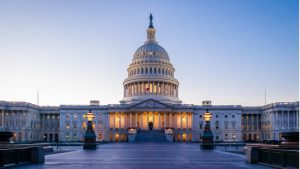Massachusetts has released a new tool to give residents a new way to access their COVID-19 digital vaccine card and vaccination history.
The Senate this week approved legislation sponsored by Sens. Gary Peters, D-Mich., and Rob Portman, R-Ohio, which would promote stronger cybersecurity coordination between the Department of Homeland Security (DHS) and state and local governments.
New York Governor Kathy Hochul announced that the Excelsior Pass and Excelsior Pass Plus are now available to all military veterans who received their COVID-19 vaccines at a U.S. Department of Veterans Affairs (VA) hospital or health care facility located within the state of New York.
The Senate on Jan. 11 voted to approve the nomination of Alan Davidson as Assistant Secretary of Commerce for Communications and Information, and head of the agency’s National Telecommunications and Information Administration (NTIA).
New York Gov. Kathy Hochul announced that the state will allocate $1 billion in funding for the ConnectALL initiative, which her office described as “the largest ever investment in New York’s 21st-century infrastructure.”
The Department of Commerce’s National Telecommunications and Information Administration (NTIA) published a notice on the Federal Register on Jan. 10 looking for input on how to best distribute over $48 billion in new broadband funding from the Infrastructure Investment and Jobs Act of 2021.
A new report found that the majority of educations – 74 percent – believe that video is more effective than text-based educational content.
The Federal Communications Commission (FCC) announced today that it is committing more than $361 million in the latest wave of funding for the Emergency Connectivity Fund program, bringing the program’s total funding to nearly $4.2 billion.
The Financial Information System for California (FI$Cal) project – now in its 17th year (not a typo) of implementation – is slogging along with a revised project plan that has reduced functionality and obscured project costs. FI$Cal is due to miss yet another planned project completion this summer, and will have to extend the project timeline by another two years.
Bloomberg Philanthropies awarded 10 cities a “What Works Cities Certification” in recognition of their “exceptional use of data to inform policy and funding decisions to improve residents’ lives.” The 10 cities are Baltimore, Md.; Buffalo, N.Y.; Chicago, Ill.; Denver, Colo.; Durham, N.C.; Evanston, Ill.; Long Beach, Calif.; Miami, Fla.; Rochester, N.Y.; and Salinas, Calif.













